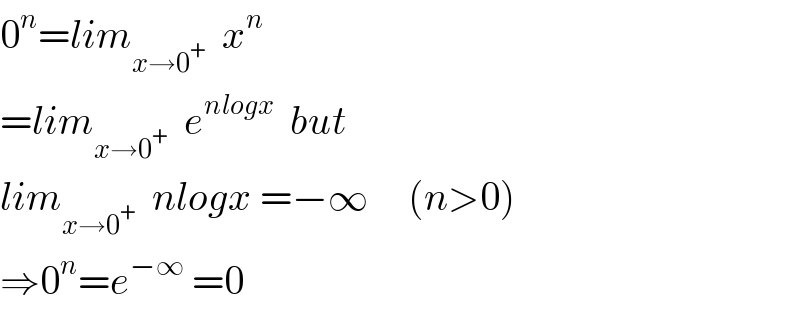
Question Number 203909 by Davidtim last updated on 01/Feb/24

$${prove}\:{that}\:\:\:\mathrm{0}^{{n}} =\mathrm{0}\:\:\:,\:\:\:\:{n}>\mathrm{0} \\ $$
Answered by Mathspace last updated on 01/Feb/24

$$\mathrm{0}^{{n}} ={lim}_{{x}\rightarrow\mathrm{0}^{+} } \:\:{x}^{{n}} \\ $$$$={lim}_{{x}\rightarrow\mathrm{0}^{+} } \:\:{e}^{{nlogx}} \:\:{but} \\ $$$${lim}_{{x}\rightarrow\mathrm{0}^{+} } \:\:{nlogx}\:=−\infty\:\:\:\:\:\left({n}>\mathrm{0}\right) \\ $$$$\Rightarrow\mathrm{0}^{{n}} ={e}^{−\infty} \:=\mathrm{0} \\ $$
Answered by witcher3 last updated on 02/Feb/24

$$\mathrm{0}^{\mathrm{n}} =\mathrm{0};\mathrm{n}=\mathrm{1} \\ $$$$\mathrm{0}^{\mathrm{n}} =\mathrm{0}.\mathrm{0}^{\mathrm{n}−\mathrm{1}} =\mathrm{0};\forall\mathrm{n}\geqslant\mathrm{2} \\ $$$$\mathrm{for}\:\mathrm{n}\geqslant\mathrm{2};\mathrm{n}−\mathrm{1}\geqslant\mathrm{1}\Rightarrow\mathrm{0}^{\mathrm{n}−\mathrm{1}} \:\mathrm{is}\:\mathrm{defined}\: \\ $$$$\mathrm{0}.\mathrm{0}^{\mathrm{n}−\mathrm{1}} =\mathrm{0}\: \\ $$$$\Rightarrow\forall\mathrm{n}\geqslant\mathrm{1}\:\mathrm{0}^{\mathrm{n}} =\mathrm{0} \\ $$$$ \\ $$
